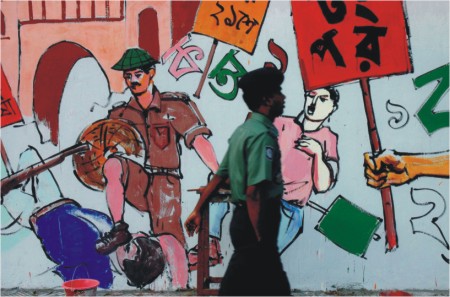
Inside
|
Reviving Professional IFTEKHAR IQBAL reminds us of history's place in our growth and edification
The gentleman was accompanying his niece in the campus that day because she was not at all convinced that history would be a good subject to pursue and he wanted to get some faculty members of the department to convince her that history was indeed worth studying. For a teacher of history, it was easy for me to sell the subject and I tried my best to encourage her. History has been a dominant subject for millennia and still it is. History gives a broader view of the world and greater knowledge of the past, which could give one a brighter sense of the future. In more realistic terms, although graduates of history have lower market value in today's Bangladesh, there are hardly any unemployed graduates. Above all, students of history have created history themselves, as well as continued to serve the nation in many pivotal capacities. In particular, History graduates from Dhaka University have reached the highest ceiling in their respective careers and have thus contributed enormously to the nation. I am not sure whether the reluctant student was convinced. I hope she will continue with history from this term. But as the uncle and the niece left my office, I felt I was trying to sell them a product with an expiration date. At the end of the day we, as professional historians, need to admit that history is steeped too much in theory and is not really doing as it should do, either in Dhaka University or in the wider academia in Bangladesh. There are many issues that we need to address as soon as possible, especially in the areas of disciplinary diversity and methodology in teaching and research, as well as in policy outlook and management. Dhaka University's History syllabus is perhaps the best in the country and its teaching staff includes a number of internationally renowned and nationally acclaimed professors whose expertise would be a serious student's reward. The syllabus covers a maximum possible span of world history, from pre-historic times to today's international history. But the syllabus is yet to truly reflect the worldwide disciplinary advancements in history that have taken place in the past three to four decades in the fields of, among others, women's history, environmental history, subaltern history, history of ideas or intellectual history, global history, history of science (Harvard has a whole department devoted to the study of history of science); urban history, history of development and governance; history of social policies.
Methodologically, our framework for learning and teaching of history remains anything but dynamic. With some refreshing exceptions, we generally tend to ask the students to evaluate a particular statesman's policies or achievements, or the significance of a particular historical event. There is no harm in such exercise, but in response to such expectations students invest most of their energy in a particular person or event without a greater understanding of the multiple temporal realities in which a person worked or an event took place. In other words, there is less scope for creative, interdisciplinary and multidisciplinary approaches. In the field of original research, we have some limitations in terms of continuity and thematic scope. Dhaka University History Department has produced a number of brilliant PhD theses, but the total number of PhDs completed since 1921 is only 23. We are yet to define whether Dhaka University is a teaching or a research university. If we aim for the latter, we need to create an environment for more original research. Thematically, there is an important but narrow nationalist focus. All PhDs in the department has been on Bengal history (with exception of 2 PhDs which have a sub-continental focus. But even within this, not a single PhD has been on the War of Liberation, although a few MPhils have focused on regional muktijuddhos). Historians are obviously interested in the wide world around them. Unfortunately, whatever international outreach we have at the undergraduate-level teaching do not lead our students to pursue the history of the wider world. There has been a clichéd repetition of already known knowledge and its dissemination without any creation of new knowledge in this field. On all these counts, our neighbouring Indian universities, e.g. Jawaharlal Nehru University, have development greatly. Faculties and students of these universities are not only showing the strength of history in the Indian academia, but also a lot of Indian students are becoming more creative in historical studies in Europe and North America, and beyond.
For instance, there is a 6 lakh-strong Bangladeshi community in the UK, but I don't know of any single Bangladesh-trained historian employed in a British university. The same applies to North American academia (I would appreciate it if any reader kindly corrects me on this point). Reviving teaching and research in Dhaka University History Department is important because most colleges that offer degrees in history follow a pretty static and traditional syllabus. So a more dynamic curriculum and research track is needed to be in place in this department. But there are also many policy issues that are harming the profession of history across the country. Only 54 government colleges and 3 private colleges across the country offer honours degree in history. More tragic is the fact that there are only 10 posts for professors of history in all of the colleges in the country. The impossibility of upward mobility in the profession at college level discourages brilliant students to take history learning and teaching seriously, which is harming the potential of the discipline itself. But if we would like to diversify the teaching, research and learning of history in the six mainstream public universities or colleges, we would also need to reconsider the place of subjects like history in the specialized universities or institutes including BUET. MIT is MIT not merely because of the cutting edge research and innovation in the fields of technology, but also because of the ways it seeks a liberal arts and social science perspective on to its own specialised products. No wonder MIT's history program is as dynamic and rich as its any other programs. (MIT's other programs include anthropology, literature, media studies, music, philosophy, and politics). Any idea of including music or philosophy in the BUET curricula would perhaps be greeted with alarm. Private universities in Bangladesh are relatively more dynamic in terms of providing a learning environment, resource uses and disciplinary diversity. Unfortunately, liberal arts and social sciences in general, and history in particular, are neglected there. Whatever course are offered in these broader disciplines are simply to comply with the University Grants Commission's minimum requirements; they do not occupy any significant place in the overall academic map of these universities. Most private universities in Bangladesh are financially well enough to put away some resources for promoting subjects like history. Or at least, more feasibly, undergraduate and graduate degrees can be offered in Bangladesh studies, in which history can have a greater share.
If such a change could be induced institutionally, it will ultimately bring both revenue and prestige to the private sector universities. Private universities in Bangladesh may take note of the policies and success stories of Lahore University of Management Sciences, a leading private university in Pakistan, which offers at least 37 courses in history, ranging from world civilisations to post-modernity. Beside the academic institutions, mainstream media also needs to take history seriously. So far, the media has accommodated and highlighted historical issues that are politically sensitive and controversial. For instance, the media has tended to depict the issue of declaration of war in 1971 as the most important mantra of Bangladesh history. Looking at it professionally, the whole saga has turned out to be like a debate on whether a maternal or paternal uncle gave the azan at the time of the birth of a child, while the child in question lies uncared for. Fortunately, such debates are not much indulged by professional historians. By going beyond such parochial areas of history, the media can promote the better and bigger side of it. At the policy front, the latest National Education Policy came as a dignified disappointment. In the section on "aims and objectives" of the policy, it recommended for "the flourishing of national history, heritage and culture and for transmission of them through generations." And that was all about it. The report chose to comment on a wide range of broader disciplines, except on the fields of liberal arts and social sciences. It may be assumed that the Education Commission was either satisfied with the current state of liberal arts and social sciences in Bangladesh; or it did not feel these areas were jugopojogee. On either counts, the lack of focus on this arena might be considered by many as sheer perceptual anarchy. The onus is also on potential guardians and students. Whatever policies or innovations we put in place, without bright students coming in to study history, no efforts can raise history to its rightful status. At Dhaka University, as elsewhere, we receive "sedimental" students, coming to us not by choice but by obligation, after failing to secure a place in other apparently attractive departments. A change of mindset among the guardians and students in regard to studying history will greatly contribute in fulfilling the possibility of the subject, either in enhancing the quality of learning, teaching and research or in curving for its graduates a space in the job market.
I have reasons to be optimistic though: the recent World Bank funded initiatives of the University Grants Commission has identified "Arts, Humanities and Social Sciences" as one of the nine thrust sectors. Its is hoped that history programs in particular, and liberal arts and social sciences in general across the country, will take up the opportunity to benefit from this Higher Education Quality Enhancement Project. There is reason to believe that a meaningful revival of the discipline of history in particular, and liberal arts and social sciences in general, would partly pave the way to reawakening Bangladesh and securing its due place in the global society. A truly advanced nation is known not only by its matter, but also by its mind, which can only be achieved through the promotion of the same. Dr. Iftekhar Iqbal is Assistant Professor of History at Dhaka University. His publications include The Bengal Delta. Ecology, State and Social Change, 1840-1943 (forthcoming with Palgrave Macmillan, 2010). |
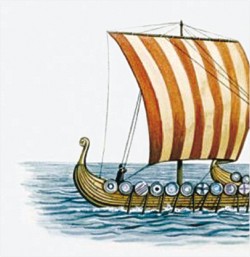 A few weeks ago, a middle-aged gentleman curiously peeped through the doors of my office room at the Arts Faculty of Dhaka University. On being invited inside, he entered along with a girl in her late teens. The girl was the gentleman's niece who had just been admitted to the History Department.
A few weeks ago, a middle-aged gentleman curiously peeped through the doors of my office room at the Arts Faculty of Dhaka University. On being invited inside, he entered along with a girl in her late teens. The girl was the gentleman's niece who had just been admitted to the History Department. 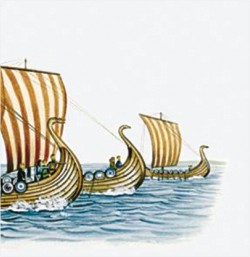 Due to the absence of such mainstream historical subjects, many pertinent sub-disciplines of history remain unexplored (Once I met a US historian who proudly identified himself as a historian of garbage, being a researcher of the history of garbage management in New York City).
Due to the absence of such mainstream historical subjects, many pertinent sub-disciplines of history remain unexplored (Once I met a US historian who proudly identified himself as a historian of garbage, being a researcher of the history of garbage management in New York City). 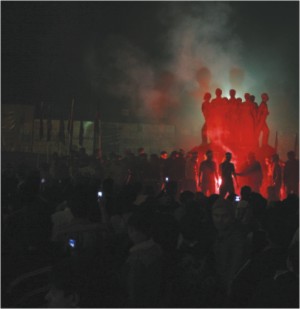 On the other hand, the number of Bangladesh-trained graduates doing higher research in history in the global academia is negligible. And also compared to Indian, and to some extent Pakistani historians, there are very few, if any, Bangladesh-trained historians who have places in the faculty of reputed universities in the West.
On the other hand, the number of Bangladesh-trained graduates doing higher research in history in the global academia is negligible. And also compared to Indian, and to some extent Pakistani historians, there are very few, if any, Bangladesh-trained historians who have places in the faculty of reputed universities in the West. 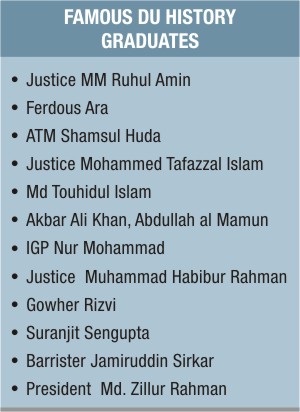 Some reserved scholarship beyond UGC quota can induce many brilliant students to study such subjects, which in turn will let the liberal arts and social sciences recover and compete with other subjects as seen in most intellectually developed academia in the world.
Some reserved scholarship beyond UGC quota can induce many brilliant students to study such subjects, which in turn will let the liberal arts and social sciences recover and compete with other subjects as seen in most intellectually developed academia in the world. 